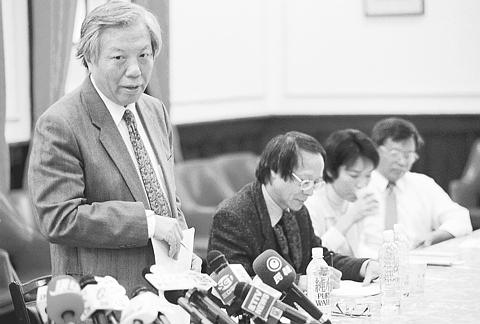Academics yesterday warned that the KMT's proposal to put its assets into trust would be a second chance for the party to launder the party's illegally acquired property. The KMT's presidential candidate Lien Chan (
The scholars said the proposal is incapable of resolving the real problem of handling assets that were obtained illegally unless the exact origins of the assets are clarified.
Tsai Tzung-jen (1/22宗珍), an associate professor of law at Tamkang University, said that the KMT had gotten its first chance to "bleach" the assets in 1992, when the Civil Organizations Law was revised to allow political parties to register themselves as a corporation.

PHOTO: CHEN CHENG-CHANG, TAIPEI TIMES
"Thereafter, the KMT obtained the legitimacy to control seven share holding companies and numerous assets," Tsai said.
Before that, the assets were registered under the names of individuals, since there was no legal basis for political parties to own assets.
"We must look into how the ownership of the assets was transferred to the KMT," Tsai said.
Since the trust system is designed to separate the ownership from management, the sources of the assets are left out of scrutiny.
Tsai said the problem of money politics must be resolved by "de-corporatizing" political parties to prohibit them from engaging in profit-making businesses.
"If the issue is not addressed, putting the assets into a trust will give the KMT a more solid excuse to increase the amount of its property," Tsai said.
Chang Ching-hsi (張2M溪), a professor of economics at National Taiwan University, pointed out that while much of the real estate now in KMT hands was handed over by the Japanese colonial government in the 1950's when it returned national assets to the new government, the KMT also took advantage of its political monopoly in the past to skim from government coffers.
Once transferring money from the national coffers became more difficult as the country opened up its practices to more public scrutiny, the KMT has over the past decade actively engaged in running businesses, several of which are monopolies, Chang said.
Chang said the assets should return to where they belong.
"It is meaningless to take others' property and put it into a trust," Chang said.
He said the involvement of gangsters in the political process and pervasive money politics can all be traced to the existence of KMT-run businesses.
Wang Wen-yu (?y?憰t), an associate professor of law at NTU, said even if the KMT actually puts its assets into a trust, it must spell out the purpose of the trust -- whether it is for "some specific public interests" or the pursuit of "the best investment interests."
Chien Yung-xiang (

AGING: As of last month, people aged 65 or older accounted for 20.06 percent of the total population and the number of couples who got married fell by 18,685 from 2024 Taiwan has surpassed South Korea as the country least willing to have children, with an annual crude birthrate of 4.62 per 1,000 people, Ministry of the Interior data showed yesterday. The nation was previously ranked the second-lowest country in terms of total fertility rate, or the average number of children a woman has in her lifetime. However, South Korea’s fertility rate began to recover from 2023, with total fertility rate rising from 0.72 and estimated to reach 0.82 to 0.85 by last year, and the crude birthrate projected at 6.7 per 1,000 people. Japan’s crude birthrate was projected to fall below six,

Conflict with Taiwan could leave China with “massive economic disruption, catastrophic military losses, significant social unrest, and devastating sanctions,” a US think tank said in a report released on Monday. The German Marshall Fund released a report titled If China Attacks Taiwan: The Consequences for China of “Minor Conflict” and “Major War” Scenarios. The report details the “massive” economic, military, social and international costs to China in the event of a minor conflict or major war with Taiwan, estimating that the Chinese People’s Liberation Army (PLA) could sustain losses of more than half of its active-duty ground forces, including 100,000 troops. Understanding Chinese

US President Donald Trump in an interview with the New York Times published on Thursday said that “it’s up to” Chinese President Xi Jinping (習近平) what China does on Taiwan, but that he would be “very unhappy” with a change in the “status quo.” “He [Xi] considers it to be a part of China, and that’s up to him what he’s going to be doing, but I’ve expressed to him that I would be very unhappy if he did that, and I don’t think he’ll do that. I hope he doesn’t do that,” Trump said. Trump made the comments in the context

SELF-DEFENSE: Tokyo has accelerated its spending goal and its defense minister said the nation needs to discuss whether it should develop nuclear-powered submarines China is ramping up objections to what it sees as Japan’s desire to acquire nuclear weapons, despite Tokyo’s longstanding renunciation of such arms, deepening another fissure in the two neighbors’ increasingly tense ties. In what appears to be a concerted effort, China’s foreign and defense ministries issued statements on Thursday condemning alleged remilitarism efforts by Tokyo. The remarks came as two of the country’s top think tanks jointly issued a 29-page report framing actions by “right-wing forces” in Japan as posing a “serious threat” to world peace. While that report did not define “right-wing forces,” the Chinese Ministry of Foreign Affairs was